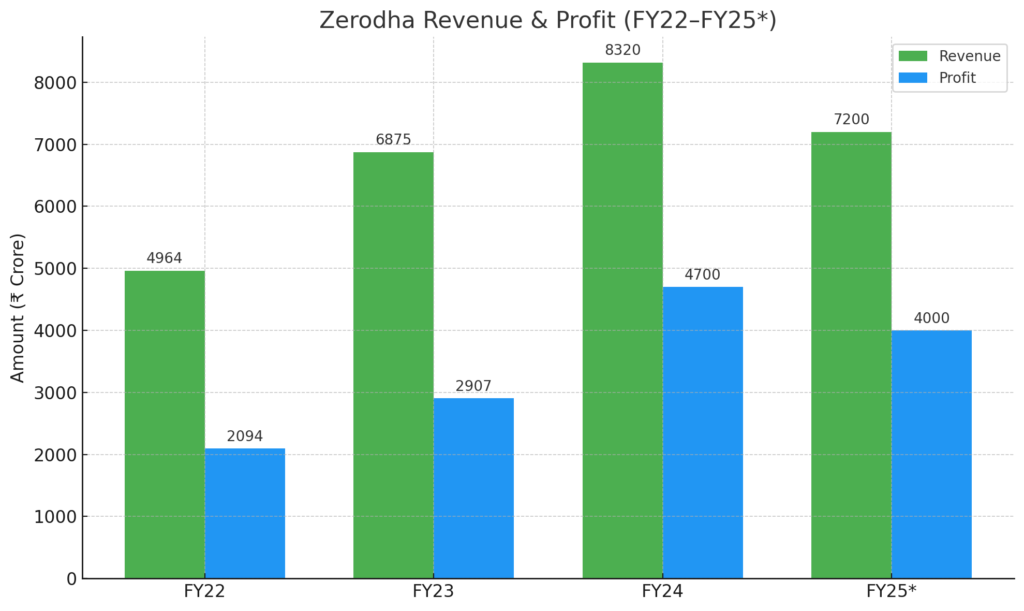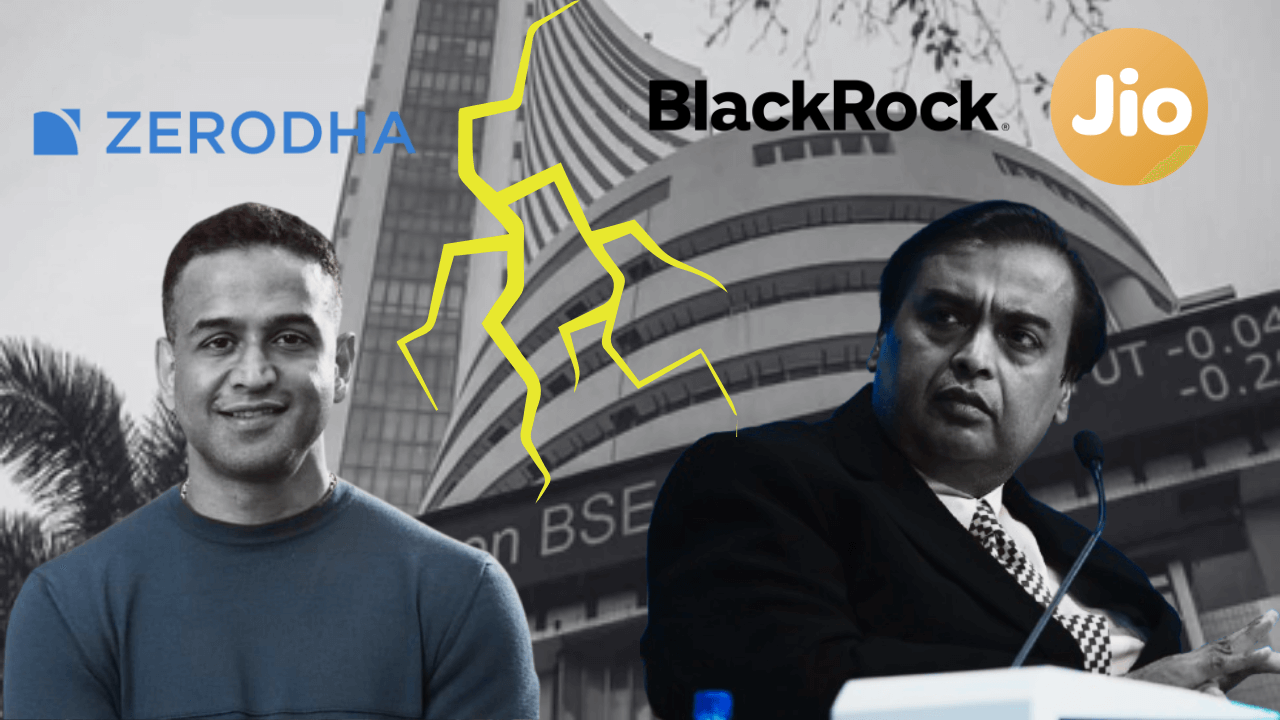You don’t have to look far to understand what’s really at play here. Jio Financial Services (JFS) has teamed up with BlackRock, secured SEBI approvals, and is now officially entering India’s stockbroking scene. For most players in the ecosystem, this would set off alarms. But Nithin Kamath, the founder of Zerodha, has a calm, clear, and unusually honest perspective.
While the industry buzzes over whether Jio will disrupt the broking space with its deep pockets, Kamath believes the real competition won’t come from giants like Jio—it will come from first-generation founders who eat, sleep, and breathe stockbroking.
- Kamath’s Official Response to Jio’s Broking License
- Deep Pockets vs Deep Philosophy
- Zerodha’s Strength Is Already in the Numbers
- What’s Really at Stake Here?
- The Jio-BlackRock Gameplan: Super App or Super Gamble?
- Why Kamath Isn’t Rattled by Jio
- Our Opinion: It's Not a Race. It's a Marathon.
- Frequently Asked Questions (FAQs)
- 1. Who is Nithin Kamath?
- 2. What is Nithin Kamath’s view on Jio Financial Services entering stockbroking?
- 3. Is Jio Financial Services a serious competitor to Zerodha?
- 4. What new licences has Jio Financial Services received?
- 5. How profitable is Zerodha compared to other stockbrokers in India?
- 6. Why does Nithin Kamath think first-time founders are a bigger threat?
- 7. What makes Zerodha different from Jio Financial Services?
Kamath’s Official Response to Jio’s Broking License
In a detailed post on X (formerly Twitter), Nithin Kamath shared his candid thoughts on Jio-BlackRock entering the broking space. Here’s exactly what he said:
“Many people asked me about Jio-BlackRock getting a stockbroking license. Firstly, this is great news. The biggest issue for the Indian markets is a lack of breadth in participation. We’re largely limited to the top 10 crore Indians.
If anyone can expand the markets beyond the top 10 crore Indians, it’s probably Jio with all its distribution might. As for how many new Indian investors have the money to invest in the market, I don’t know.
How do we think about broking?
We are not chasing vanity metrics. The idea is to stay profitable and, more importantly, ensure that we stick to the principles and philosophies that have gotten us this far. At the heart of our philosophy is to always do the right thing for customers.
This means not pushing customers to trade and ensuring there are no unnecessary notifications, dark patterns, etc.
We understand that in the long term, the odds of success are better if customers trade less; most of our product decisions are based on this.
We’re not interested in acquiring customers using one plan and changing the pricing later.
And more…So yeah, we are in no hurry. We are in it for the long haul and are always working to ensure we have the best product offerings that help our customers grow with us. I don’t know if you can say the same about many other financial services businesses in the industry, who are constantly looking to grow at any cost.
And yeah, I still feel our real competition is going to be more from first-generation founders who are running, breathing, and always thinking about broking. I somehow don’t feel it is really going to be from incumbents. This is not a business where having deep pockets means you have a large moat.
But yeah, I might be wrong.”
This statement not only reflects Kamath’s mindset but also gives us a peek into why Zerodha has become one of India’s most trusted platforms. It’s not built on noise—it’s built on principles.
READ MORE –How Wang Ning’s Pop Mart and Labubu Dolls Made Him One of China’s Richest Entrepreneurs
Deep Pockets vs Deep Philosophy
What makes Nithin Kamath stand out is his long-term view. Where many players aim for customer acquisition and rapid growth, Zerodha has taken the opposite route — focusing on profitability, sustainable design, and a “do no harm” approach to financial behavior.
Kamath says it upfront:
“We’re not interested in acquiring customers using one plan and changing the pricing later.”
This is a direct contrast to many financial apps that offer something free or discounted upfront, only to tweak pricing later. It’s a strategy that breeds short-term numbers, but not long-term trust.
Zerodha’s Strength Is Already in the Numbers

Zerodha isn’t just a values-first company—it’s also a revenue machine. The company posted a whopping ₹5,496.3 Cr in net profit in FY24, up nearly 89% from the year before. And it did that without raising a single rupee from VCs.
Operating revenue climbed to ₹9,372.1 Cr in FY24, thanks to their loyal base of retail traders and investors. All this, while avoiding vanity metrics and sticking to a minimalist, user-first experience.
What’s Really at Stake Here?
Let’s not forget the bigger picture. The Indian fintech space is getting crowded. From Paytm to Groww to Angel One, everyone is chasing a slice of the same pie. The difference is, platforms like Zerodha already own a loyal base of serious investors.
Kamath’s edge has always been long-term thinking. He’s building for a decade—not just the next quarter. Zerodha DataLabs, Rainmatter, and the push for financial literacy are proof that he sees broking as a mission, not just a product.
The Jio-BlackRock Gameplan: Super App or Super Gamble?
Now to be fair, Jio Financial Services isn’t just building a broking app—it’s stitching together a multi-layered investing ecosystem:
- Jio BlackRock Asset Management – Approved by SEBI, launched with two low-risk mutual funds.
- Jio BlackRock Investment Advisers – Registered as a SEBI-approved investment adviser.
- Jio BlackRock Broking – Recently received broking and clearing licenses.
Put all that together with Jio Payments Bank, and what you have is a platform that could potentially bundle banking, investing, and payments under one seamless user experience.
Sounds powerful, right?
But as Nithin Kamath pointed out, distribution is not retention. Getting users to sign up is one thing. Getting them to trust your platform with their investments, day in and day out—that’s something else entirely.
Why Kamath Isn’t Rattled by Jio
Sure, Jio Financial Services has the scale. With 469 million telecom users and its own payments bank, Jio can bring a lot of people into the investing ecosystem. That’s something Kamath acknowledges too — even calls it “great news”.
But here’s the kicker: Stockbroking isn’t about scale. It’s about trust.
Kamath says it himself:
“This is not a business where having deep pockets means you have a large moat.”
Jio’s real challenge won’t be setting up the platform—it’ll be earning the same kind of user trust that Zerodha has built over 14 years.
Our Opinion: It’s Not a Race. It’s a Marathon.
For Nithin Kamath, this isn’t a sprint to win headlines—it’s a marathon of staying true to the customer. Whether it’s not nudging users to overtrade or building features that reward long-term investors, Zerodha has always played the long game.
“We are in it for the long haul and are always working to ensure we have the best product offerings that help our customers grow with us.”
In a market full of noise, Kamath’s calm approach might just be Zerodha’s biggest moat.
Frequently Asked Questions (FAQs)
1. Who is Nithin Kamath?
Nithin Kamath is the co-founder and CEO of Zerodha, India’s largest and most profitable stockbroking platform. Known for his bootstrapped success and focus on long-term financial education, Kamath has become a respected voice in India’s fintech ecosystem.
2. What is Nithin Kamath’s view on Jio Financial Services entering stockbroking?
Nithin Kamath believes that Jio Financial Services (JFS) is not a direct threat to Zerodha. He acknowledged Jio’s vast distribution network but said that real competition comes from first-generation founders who are deeply invested in the stockbroking business.
3. Is Jio Financial Services a serious competitor to Zerodha?
While JFS has the brand power and scale to shake up the market, Kamath argues that deep pockets alone don’t create a competitive moat in stockbroking. Trust, user experience, and product focus remain key differentiators for platforms like Zerodha.
4. What new licences has Jio Financial Services received?
JFS and its partner BlackRock have secured multiple SEBI licences including:
- Asset Management (Jio BlackRock Mutual Fund)
- Investment Advisory
- Stockbroking and Clearing
This gives JFS a wide reach across the entire investing value chain.
5. How profitable is Zerodha compared to other stockbrokers in India?
Zerodha posted a profit after tax of ₹5,496.3 crore in FY24, an 88.95% jump from the previous year. Its operating revenue stood at ₹9,372.1 crore—figures that make it one of India’s most profitable fintech companies, even without external funding.
6. Why does Nithin Kamath think first-time founders are a bigger threat?
According to Kamath, first-time founders live and breathe broking, giving them sharper focus and more agility than legacy players or big corporate entrants. These founders are more likely to innovate and respond quickly to market needs.
7. What makes Zerodha different from Jio Financial Services?
Zerodha is focused purely on broking and investing, with a strong emphasis on simplicity, transparency, and financial literacy. JFS, on the other hand, is building a super app ecosystem that bundles payments, banking, and investment under one platform.






Leave a Reply